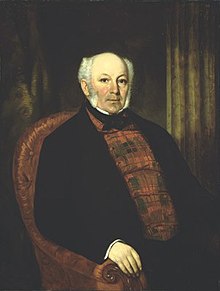Allan MacNab
| Sir Allan Napier MacNab, Bt | |
|---|---|

The Hon. Allan Napier MacNab by Théophile Hamel
|
|
| Premier of Canada West | |
|
In office 1854–1856 |
|
| Preceded by | Francis Hincks |
| Succeeded by | John A. Macdonald |
| Personal details | |
| Born |
19 February 1798 Newark (now Niagara-on-the-Lake), Upper Canada |
| Died | 8 August 1862 (aged 64) Hamilton, Canada West |
| Political party | Tory |
| Profession | businessman, soldier, lawyer |
| Religion | Anglican, Catholic |
Sir Allan Napier MacNab, 1st Baronet (19 February 1798 – 8 August 1862) was a Canadian political leader and Premier of the Province of Canada, from 1854 to 1856.
He was born in Newark, (now Niagara-on-the-Lake) to Allan MacNab and Anne Napier; daughter of Captain Peter William Napier, R.N., the commissioner of the port and harbour of Quebec. When MacNab was a one-year-old, he was baptized in the Anglican church in St. Mark's Parish of Newark. His father was a lieutenant in the 71st Regiment and the Queen's Rangers under Lt-Col. John Graves Simcoe. After the Queen's Rangers were disbanded, the family moved around the country in search of work and eventually settled in York (now Toronto), where MacNab was educated at the Home District Grammar School.
As a fourteen-year-old boy, he fought in the War of 1812. He probably served at the Battle of York and certainly as the point man in the Canadian forlorn hope that headed the Anglo-Canadian assault on Fort Niagara. The 20 local men eliminated two American pickets of 20 men each with the bayonet before taking part in the final assault. Captain Kerby, of the Incorporated Militia Battalion, was reportedly the first man into the fort.
After the war, he studied law in Toronto and was admitted to the bar in 1824. In 1826, MacNab moved from York to Hamilton, where he established a successful law office, but it was chiefly by land speculation that he made his fortune. There was no Anglican church in Hamilton yet so MacNab attended a Presbyterian church until Christ Church was established, in 1835.
In 1830, he was elected to represent the city in the Legislative Assembly of Upper Canada, a position that he held for some 27 years.
As a member of the legislature, MacNab opposed the reform movement in Upper Canada that was led by William Lyon Mackenzie. When Mackenzie led the Upper Canada Rebellion in 1837, MacNab was part of the British militia that moved against Mackenzie at Montgomery's Tavern in Toronto on 7 December, dispersing Mackenzie's rebels in less than an hour. On 29 December, MacNab and Captain Andrew Drew, of the Royal Navy, commanding a party of militia, acting on information and guidance from Alexander McLeod, attacked Mackenzie's supply ship at Navy Island. The sinking of the SS Caroline became known as the Caroline affair.
...
Wikipedia
